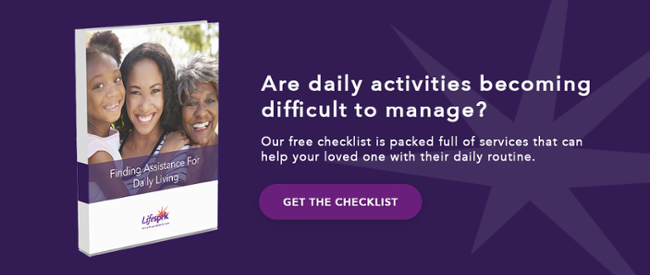
None of us should settle for an unsparked life, regardless of cognitive levels. That’s the message Joel Theisen, RN, Lifesprk’s CEO/Founder shared with listeners on Lori La Bey’s ‘Alzheimer’s Speaks’ radio show earlier this week. “Your life experience has to go at the same trajectory as the illness,” said Joel. “We can still be silly, joyful, and experience life even with Alzheimer’s. It still matters and needs to be part of the journey. We all get old, but it’s how we make the most of it, how we spark the life we have.”
Recently there has been some powerful evidence that backs up Joel’s message that proves purpose – that is, having a meaningful purpose in life – plays a significant role in decreasing cognitive decline, even if you have an Alzheimer’s. You may not be able to ‘cure’ the disease but living with purpose has a tremendous impact on how you live it – in fact, purpose may just be the secret weapon in the war on dementia.
Dementia can often have a 10-year trajectory – and as needs change, there can be tremendous burden on the family because those needs fall into gaps that aren’t covered by any health insurance. Many people believe Medicare will cover what they need, but only the acute health issues are covered, not the day-to-day support whether they need home care or additional long-term care services. And identifying someone’s purpose and helping to foster it typically isn’t addressed with traditional home care services.
But at Lifesprk it is – and Lifesprk fills in those gaps that Medicare doesn’t cover, creating a seamless continuum of support. Joel described how Lifesprk’s Life Care Managers (nurses) provide proactive guidance to improve the overall experience for each client and family while reducing as much as possible long-term costs. Lifesprk’s focus on purpose, along with identity, social supports and passion all play a role in shifting our predetermined ideas of what living with Alzheimer’s can mean.
Take Beverly Urness, a Lifesprk client with dementia, as one example. Beverly’s daughter’s main concern was dementia would rob her mother of her passion for playing the piano. She didn’t want her mom to lose sight of that – that was the hardest part. That goal became the focal point of Beverly’s Life Plan – not treating the dementia, not curing the illness, but prioritizing what mattered to create a powerful aging experience for Beverly amid these limitations. Her Life Care Manager did whatever she could to continually keep the music playing and it led to increased engagement and better outcomes for everyone.
As Joel stresses, there is so much we can do for people living with Alzheimer’s to ‘spark lives’ that goes beyond just treating them and to better serve their families. “At Lifesprk, we refuse to accept that there is any other way. For those estimated 5.4 million Americans living with Alzheimer’s, we want you and your family members to know there is hope in an approach to care that allows you to continue to feed your purpose to live a sparked life. And to provide the coordinated, caregiving support and guidance that enables family members to live their sparked lives too. It is exactly what we’d want for ourselves.”
We encourage you to listen to Joel’s full interview with Lori about their personal experiences with loved ones diagnosed with Alzheimer’s and share your experience – what has been the impact of a loved one living with dementia meant for you? How can a focus on living a sparked life – a purposeful life – even in the midst of this disease change that experience?



